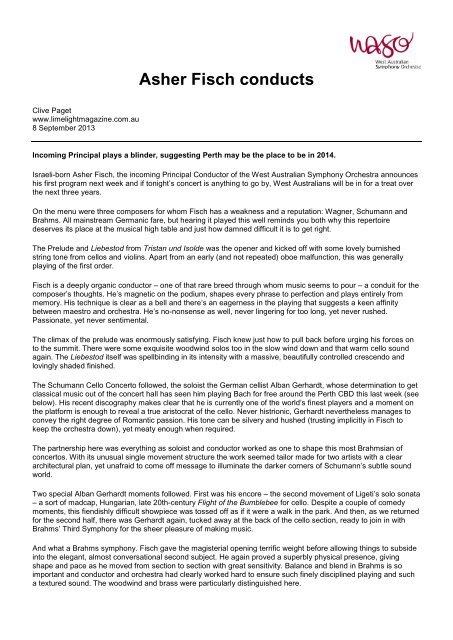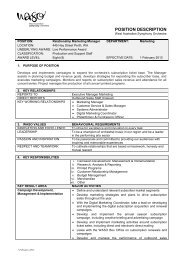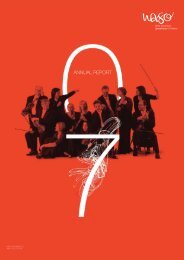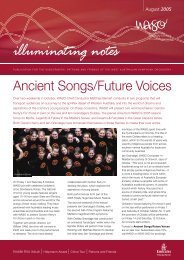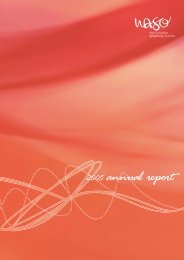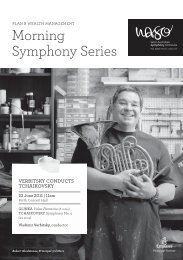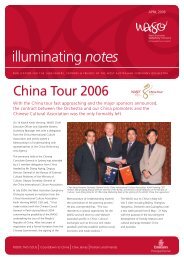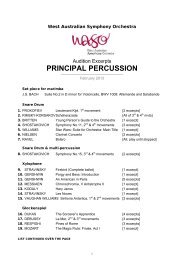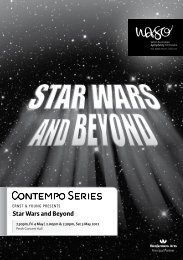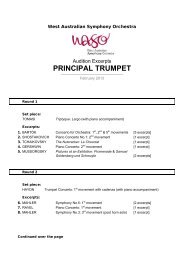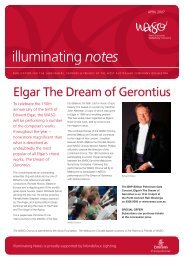Asher Fisch conducts - West Australian Symphony Orchestra
Asher Fisch conducts - West Australian Symphony Orchestra
Asher Fisch conducts - West Australian Symphony Orchestra
You also want an ePaper? Increase the reach of your titles
YUMPU automatically turns print PDFs into web optimized ePapers that Google loves.
<strong>Asher</strong> <strong>Fisch</strong> <strong>conducts</strong>Clive Pagetwww.limelightmagazine.com.au8 September 2013Incoming Principal plays a blinder, suggesting Perth may be the place to be in 2014.Israeli-born <strong>Asher</strong> <strong>Fisch</strong>, the incoming Principal Conductor of the <strong>West</strong> <strong>Australian</strong> <strong>Symphony</strong> <strong>Orchestra</strong> announceshis first program next week and if tonight’s concert is anything to go by, <strong>West</strong> <strong>Australian</strong>s will be in for a treat overthe next three years.On the menu were three composers for whom <strong>Fisch</strong> has a weakness and a reputation: Wagner, Schumann andBrahms. All mainstream Germanic fare, but hearing it played this well reminds you both why this repertoiredeserves its place at the musical high table and just how damned difficult it is to get right.The Prelude and Liebestod from Tristan und Isolde was the opener and kicked off with some lovely burnishedstring tone from cellos and violins. Apart from an early (and not repeated) oboe malfunction, this was generallyplaying of the first order.<strong>Fisch</strong> is a deeply organic conductor – one of that rare breed through whom music seems to pour – a conduit for thecomposer’s thoughts. He’s magnetic on the podium, shapes every phrase to perfection and plays entirely frommemory. His technique is clear as a bell and there’s an eagerness in the playing that suggests a keen affinitybetween maestro and orchestra. He’s no-nonsense as well, never lingering for too long, yet never rushed.Passionate, yet never sentimental.The climax of the prelude was enormously satisfying. <strong>Fisch</strong> knew just how to pull back before urging his forces onto the summit. There were some exquisite woodwind solos too in the slow wind down and that warm cello soundagain. The Liebestod itself was spellbinding in its intensity with a massive, beautifully controlled crescendo andlovingly shaded finished.The Schumann Cello Concerto followed, the soloist the German cellist Alban Gerhardt, whose determination to getclassical music out of the concert hall has seen him playing Bach for free around the Perth CBD this last week (seebelow). His recent discography makes clear that he is currently one of the world’s finest players and a moment onthe platform is enough to reveal a true aristocrat of the cello. Never histrionic, Gerhardt nevertheless manages toconvey the right degree of Romantic passion. His tone can be silvery and hushed (trusting implicitly in <strong>Fisch</strong> tokeep the orchestra down), yet meaty enough when required.The partnership here was everything as soloist and conductor worked as one to shape this most Brahmsian ofconcertos. With its unusual single movement structure the work seemed tailor made for two artists with a cleararchitectural plan, yet unafraid to come off message to illuminate the darker corners of Schumann’s subtle soundworld.Two special Alban Gerhardt moments followed. First was his encore – the second movement of Ligeti’s solo sonata– a sort of madcap, Hungarian, late 20th-century Flight of the Bumblebee for cello. Despite a couple of comedymoments, this fiendishly difficult showpiece was tossed off as if it were a walk in the park. And then, as we returnedfor the second half, there was Gerhardt again, tucked away at the back of the cello section, ready to join in withBrahms’ Third <strong>Symphony</strong> for the sheer pleasure of making music.And what a Brahms symphony. <strong>Fisch</strong> gave the magisterial opening terrific weight before allowing things to subsideinto the elegant, almost conversational second subject. He again proved a superbly physical presence, givingshape and pace as he moved from section to section with great sensitivity. Balance and blend in Brahms is soimportant and conductor and orchestra had clearly worked hard to ensure such finely disciplined playing and sucha textured sound. The woodwind and brass were particularly distinguished here.
The second movement by contrast was all nut-brown tone, an autumnal Andante with an irresistible ebb and flow.<strong>Fisch</strong> judged perfectly when, and how much passion he could inject into the central section. The third movementwas graceful with just the right degree of rubato, and again, some lovely string tone, especially in the (Gerhardtenhanced) cello section. The finale was splendidly done, with <strong>Fisch</strong> coaxing every ounce of drama out of it, yet stillproducing swathes of smooth tone in the lyrical passages.An outstanding concert, then, with orchestra on excellent form, inspired soloist and inspiring conductor. If <strong>Asher</strong><strong>Fisch</strong>’s tenure with WASO is going to produce work of this calibre, I for one will be itching to get on a plane forPerth on a monthly basis.<strong>Asher</strong> <strong>Fisch</strong> Conducts6 & 7 SeptemberPerth Concert Hall


